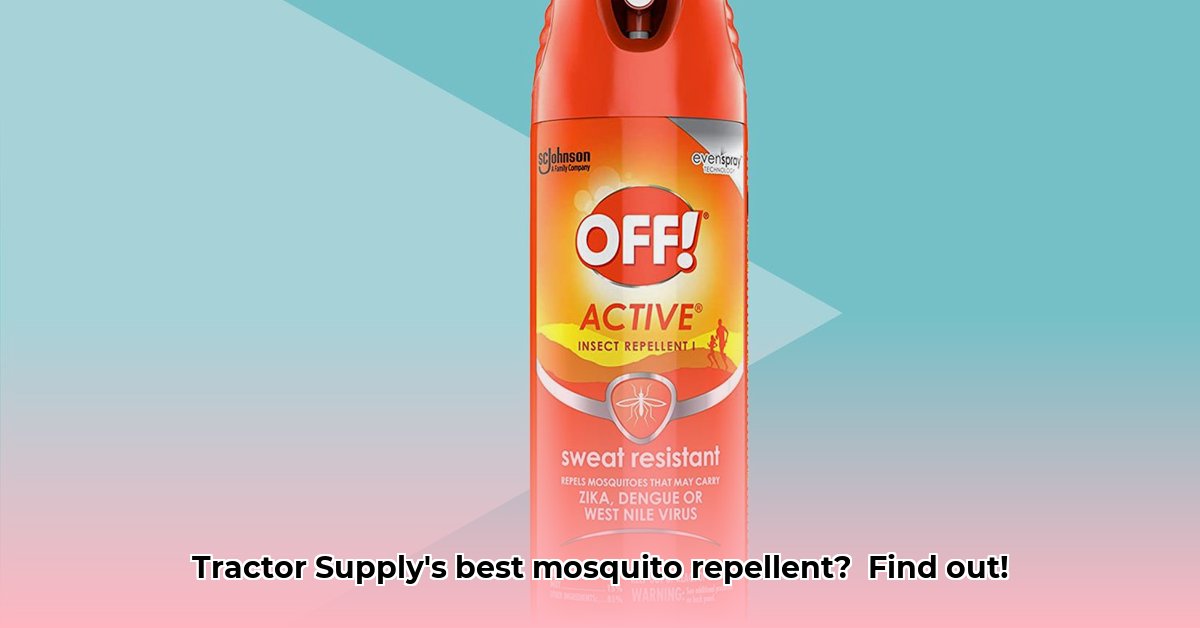
Finding effective mosquito control for your farm is crucial for protecting livestock, crops, and your own well-being. While harsh chemical pesticides might seem like a quick fix, they can harm beneficial insects and the environment. This guide will help you find the best mosquito repellents at Tractor Supply while aligning with sustainable farming practices. We'll explore Integrated Pest Management (IPM) strategies, comparing various repellent options and providing actionable steps you can take to create a healthier, more sustainable farm environment. For more Tractor Supply resources, check out this helpful guide.
Understanding Sustainable Mosquito Control
Sustainable farming emphasizes protecting the entire ecosystem. Chemical pesticides, while effective in killing mosquitoes, can have detrimental effects. They harm beneficial insects like bees and ladybugs, crucial for pollination and pest control. These chemicals can also contaminate water sources and pose health risks. Therefore, a more environmentally conscious approach is essential.
Integrated Pest Management (IPM): A Holistic Approach
Integrated Pest Management (IPM) is a holistic approach that prioritizes prevention and minimizes pesticide use. It's about managing mosquito populations, not eradicating them entirely. IPM combines different tactics to create a balanced ecosystem, reducing the reliance on harsh chemicals. Think of it as a multifaceted strategy, rather than a single solution. This approach has proven successful in many agricultural contexts, leading to healthier environments and more resilient crops.
Choosing the Right Repellent at Tractor Supply
Tractor Supply offers various mosquito repellents. Selecting the right one depends on several factors:
Active Ingredient: Common ingredients include DEET (powerful but potentially harsh), picaridin (gentler and environmentally friendlier), IR3535 (similar to picaridin), and oil of lemon eucalyptus (plant-based). The choice depends on your tolerance, skin sensitivity, and environmental concerns. Always read labels carefully.
Application Method: Sprays provide broad coverage, while candles and coils offer localized protection. The best method will depend on the area you need to treat and its size. Large-scale farms might require sprays, while smaller areas such as patios may benefit more from candles.
Environmental Impact: Prioritize repellents with minimal environmental impact. Look for biodegradable options and those less harmful to non-target organisms, including beneficial insects.
Personal Needs: Consider skin sensitivities and allergies. Opt for repellents formulated for sensitive skin if needed. Always test a small area first to avoid unforeseen reactions.
Implementing IPM for Mosquito Control: A Step-by-Step Guide
Effective mosquito control relies on a multi-pronged approach:
Step 1: Eliminate Breeding Grounds: Mosquitoes breed in standing water. Regularly remove sources of stagnant water around your farm, such as clogged gutters, old tires, and unused containers. This prevents mosquito larvae from developing and dramatically reduces future populations.
Step 2: Encourage Natural Predators: Encourage natural predators like dragonflies and bats. These creatures feed on mosquitoes, providing an ecological control method. Consider planting vegetation that attracts them to your farm. This approach increases biodiversity and offers a sustainable solution for controlling mosquito populations.
Step 3: Utilize Physical Barriers: Use mosquito netting to protect livestock or vulnerable areas. Mosquito traps can be effective in reducing localized populations. These barriers prevent mosquitoes from accessing specific areas, adding another layer of protection.
Step 4: Strategic Repellent Use: Employ repellents strategically and only when necessary. Focus on areas with high mosquito activity, minimizing the overall use of chemicals. Targeted application ensures maximum effectiveness while reducing environmental impact.
Comparing Repellent Options
| Repellent Type | Pros | Cons | Environmental Impact |
|---|---|---|---|
| DEET-based Sprays | Highly effective, long-lasting protection | Potentially harsh on skin and environment | Moderate to High |
| Picaridin Sprays | Effective, gentler on skin, environmentally friendly | May not be as long-lasting as DEET | Low to Moderate |
| Oil of Lemon Eucalyptus Sprays | Plant-based, gentle, environmentally friendly | Less potent, shorter duration of protection | Low |
| Citronella Candles/Coils | Natural scent, readily available | Limited range, less effective than sprays | Low |
Remember that combining several IPM strategies provides the most effective and sustainable approach to mosquito control. A balanced strategy will achieve better results and reduces reliance on harsh chemicals.
Ongoing Research and Future Considerations
The field of sustainable pest management is constantly evolving. New and innovative methods are continuously being developed. Stay updated on the latest research and best practices by consulting local agricultural extension offices or universities. They can provide tailored advice on your region's specific needs. This ensures that your farming practices remain at the forefront of sustainable methodology.
By adopting a proactive IPM approach, you can create a healthier and more sustainable farm environment while effectively managing mosquito populations. This holistic approach benefits your crops, livestock, and the environment, resulting in a thriving and resilient farm.